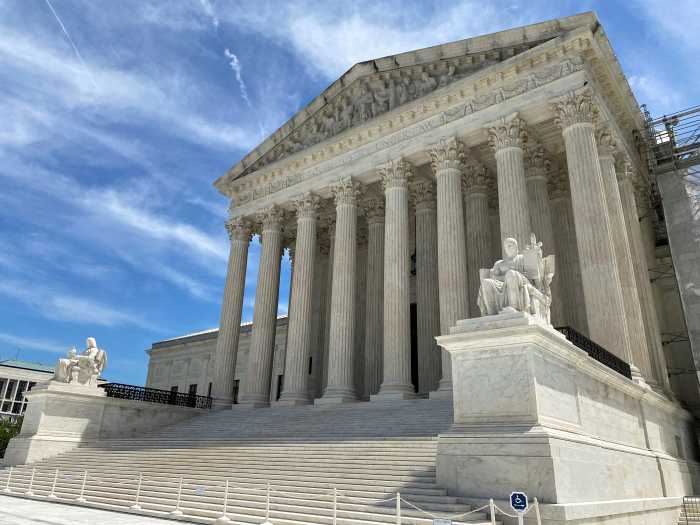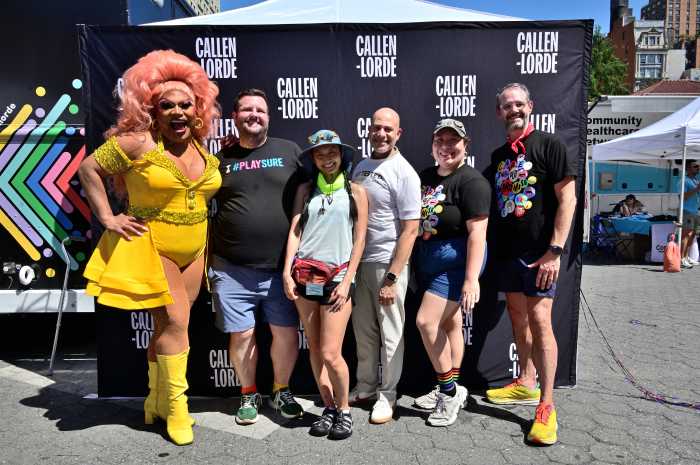Donald Suggs and his longtime partner Jeremy Hess.
Donald M. Suggs, Jr., the famously gregarious and fierce defender of civil rights causes, died from complications of a heart condition in New York City on October 5. He was 51.
A native of St. Louis, Suggs was a long-time East Village resident who, at points in his career, was a senior editor at the Village Voice, an associate director of the Gay & Lesbian Alliance Against Defamation (GLAAD), and a program director at the Harlem United Community AIDS Center. His advocacy work included LGBT, youth, and people of color issues and focused largely on community building.
As a writer, Suggs may be remembered most for his May 1988 Village Voice article “Venus Envy: The Drag Balls of Harlem.” The article was the first major media attention paid to the inner world of the House of Xtravaganza, a group of African-American and Latino “impossible beauties,” as the transgender “fem queens” were known. It was Suggs’ work that introduced to the world the likes of Angie Xtravaganza and Venus Xtravaganza, stars of the Harlem ballroom scene. The article caught the eye of filmmaker Jennie Livingston, who chronicled the scene in her legendary, award-winning 1990 film “Paris is Burning.”
Livingston said of Suggs’ passing, “He was a beautiful man. A kind person. An endless storyteller. One of the first out queers I ever met –– as a teenager at Yale. Very funny. Relentlessly outspoken, about all the important things.”
Chi Chi Valenti, a writer at Details magazine while Suggs was at the Voice, said they were both researching the drag ball scene during the same period –– a situation in which “some writers would have been weird, shady, or competitive. Donald instead became a fast friend and one of my favorite East Village sightings for the next 25 years.”
The St. Louis American, where Suggs’ father, Donald, Sr., is publisher and executive editor, quoted Jennifer Steinhauer, a writer for the New York Times who interned at the Village Voice while Suggs was an editor, saying “Donald was a beautiful person who brought light into the lives of all comers. While not religious per se, he was the most ministering person I know, keeping faith and fellowship with the fancy and the forgotten, the establishment stars and those whom life and circumstances had kicked aside. All had a home with Donald, and his big belly laugh, his charming scolds, his eclectic evenings.”
Lesbian activist Maria Ettinger, a longtime friend, noted on Facebook that Suggs was a pioneering force in his undergraduate days at Yale: “When Donald came out, he found the rigid confines of the gay status quo were not for him. Donald helped mobilize a group of students, diverse in gender, race, and sexual orientation who forged ties of common purpose and friendship among Yale’s marginalized populations. Donald’s confidence and pride as an African American and as a gay man, his innate and infallible feminism, and his infectious sense of joy elevated him into a highly visible leader of the cultural evolution unfolding at Yale.”
Even as a young man, Suggs was a bold standout. Childhood friend Alexandra Alger wrote, also on Facebook, that during a high school year abroad program in France she was “blown away by a short story he wrote –– he was an amazing writer, even then. When I saw him at Yale the next year, he was wearing purple eye shadow. He looked great. He was one of the most inspirational people there. It seems he inspired people throughout his life.”
Suggs was a founder of People Using Media to Do Prevention, or the PUMP project, which taught young people from neighborhoods devastated by HIV how to produce prevention videos. Better World Advertising, which manages HIV messaging campaigns targeting LGBT and people of color communities, grew out of the PUMP effort. Suggs also worked on prevention education projects internationally –– from Puebla, Mexico to Santo Domingo and Bani in the Dominican Republic.
As a journalist, Suggs was also a contributor to the New York Times and the Advocate, among other publications. As a board member at the Manhattan Neighborhood Network, he was instrumental in bringing “Gay USA” into the fold there.
Suggs’ fedora hats, hundreds of pairs of shoes, love of vintage eyeglasses, and bigger than life laugh made him one of the most popular faces to walk the streets of Alphabet City. Many people referred to him as “the Mayor of the East Village.” Amanda Pelham, a friend, commented on Facebook that a chance encounter on the streets always led to “the best conversations… his storytelling, insight, fierce fighting spirit, and that HUGE laugh… would stay with me, for days.
In addition to his father, he is survived by his partner Jeremy Hess, son Luis Ramirez, mother Betty, sisters Dawn and Dina, niece Delali Maxine, and grandmother Elnora.
A memorial service for Donald Suggs will be held on December 8 at 1 p.m. at St. Mark's Church, 131 East Tenth Street at Second Avenue. In lieu of flowers, the family asks that donations be sent to Grassroots Leadership, P.O. Box 36006, Charlotte, NC 28236, or to the One Iowa Education Fund, 419 SW Eighth Street, Des Moines, IA 50309.


































